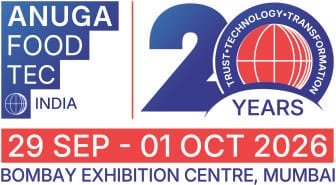Impact of Covid-19 has given the food processing industry a lot of hard lessons. As consumer perception has changed about processed food, their consumption and purchase behaviour will also change. That will dictate the product formulation, quality, standards of operating practices, and the gross margin of the products, explicates Rajat K Baisya.
The year of the pandemic has given the food processing industry a lot of hard lessons, which has changed the perception about the products and services which need to be taken into consideration to decide the future direction of the business categories that they own. Food products have been considered essential items in many countries, and food stores were kept open every day following some guidelines during lockdown periods. In the days of disruption, the old ball games do not work, and new rules and practices take precedence over the established understanding of the consumers.
Although the pandemic is still not over, even if vaccines are developed and new cases and deaths are declining in numbers, what is happening in the UK can happen elsewhere. The food processing industry has to focus on future strategies and draw up plans for managing the business for performance. As consumer perception has changed about processed food, their consumption and purchase behaviour will also change. That will dictate the product formulation, quality, standards of operating practices, and the gross margin of the products that processors will sell.
For consumers, the pandemic seems to have strengthened their concerns about product safety as well as employees’ health. According to a study carried out by Mckinsey, 20-25% consumers in developed markets are researching on food brands and products before they make decisions to purchase. And key considerations are that if the product is safe and healthy, the packaging hygienic and welfare of the employees stood as top decision-making considerations.
And in emerging markets where these figures even exceed 40%, 35 %, and 45% of consumers in India, South Korea, and China, respectively, this would mean that concerns in emerging markets are much greater on the similar criteria. This is quite significant that in India, 40% of the consumers’ buying decisions are now based on new criteria and considerations where hygienic packaging and employees welfare and health stood as the top most important criteria.
The food safety standards will also undergo changes keeping in mind the new perception of the consumers with regard to quality and safety and employee welfare criteria. This itself will pose serious challenges to many processors. The product quality and safety will also dictate the product composition and formulations. Many large companies are also reviewing their product compositions in light of the consumers’ new expectations and based on new knowledge on the subject and the latest scientific literature. Many processors in India have to relook at their products and formulations in terms of new realities.
In the US, specific social issues have emerged. The survey of the US Centers for Disease Control and Prevention revealed that a certain ethnic group working in the meat industry accounted for 87 % of confirmed Covid cases in meat processing plants between April and May during the pandemic.
In view of these findings and the pandemic-induced scrutiny on companies’ social beliefs and practices, it is now generally believed that the food processing industry is unlikely to maintain the pre-pandemic operational status quo. The only way forward is that food processing companies will follow different price structures and product standards and even discontinue certain products altogether. Some of these changes are likely to be driven by Government agencies and regulators seeking to limit the spread of contagious diseases.
For example, The German Federal Government has already announced a ban on contract and temporary workers at meat processing plants from January 2021; this will force meat processors in Germany to directly employ all staff and workers at a much higher cost reflecting different pricing of the product and impact business volume. This ban has come into force based on the European Federation of Food Agriculture and Tourism Trade Unions’ suggestion. In Netherland, also similar move is on the cards where trade unions are demanding direct employment of workers engaged in food processing.
The imperative of these requirements for adhering to enhanced regulatory guidelines, businesses, and brands pursuing growth will be required to positively differentiate these social factors to gain market share. Large companies and MNCs are evaluating these new pandemic related parameters. Some companies are also seen taking proactive actions such as fitting hospital-grade air filters in the ventilator and air handling unit. Even some companies have voluntarily reduced the working hours in a shift and implemented social distancing convention for workers.
The impact of all these will be that the companies will inevitably face increased operating costs, squeezed margins, and unused capacity for an indefinite period on top of the prospect of workforce shortages as migrant workers remain at home due to travel restrictions. The technology adoption in the processed food industry has long lagged behind, but other consumer goods sector has already adopted advanced technology such as robotic automation. However, these changes may stimulate transition for the food processing industry also.
Indian food processing industry is dominated by large numbers of small-scale and MSME processors who have limited resources and low technology adoption. There are large industries that operate on a contract manufacturing system. Even some of the big volume brands like say ParleG are produced on contact manufacturing plants, and there will be increased pressure on those companies to keep control of new norms of safety and quality.
Some of these will be regulator-driven, and the rest will be consumers driven. But one thing is sure that processors have to evaluate these criteria seriously and take measures so that they can make those claims to convince their consumers that they are making new standards and implementing those with all seriousness to make their product well differentiated from the rest, which can help them to grow faster than the rest and gain relative market share.
It has to be seen how smaller players will gear up to these new challenges to ensure their growth and survival. The food businesses will not be as usual any longer in the post-pandemic period.
The author is the chairman of Strategic Consulting Group and served as Professor and Head of the Department of Management Studies, IIT Delhi.
Photo created by aleksandarlittlewolf – www.freepik.com
















